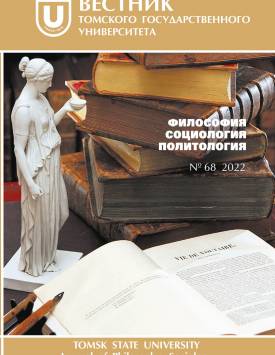A logical procedure: A view through the prism of the cognitive paradigm
The article presents the results of elaboration a fragment of the logical procedure theory. It is based on the cognitive approach. Within the framework of this approach, logical procedure (LP) is considered as a system of actions or operations aimed at constructing or transforming a certain logical object. The cognitive approach to LP is concretized on the basis of the methodology of analyzing the intellectual problems solutions. The article develops the ideas proposed in the paper “Epistemological status of a logical procedure: logical vs cognitive?” (Tomsk State University Journal of Philosophy Sociology and Political Science, No. 60) and is focused on the structural analysis of logical procedures. The author differentiates LP and a logical operation: a logical operation is considered as an elementary LP, not divided into components. The connection between a logical operation and LP is explicated as a subordination: every logical operation (and any set of interrelated operations) is LP, however, it is not true that any LP is a regularized set of logical operations and only them. In the structures of LP can be found the cognitive components that are not logical. The article proposes classifications of LPs based on their structural characteristics. LPs are divided by the number of procedural elements into simple (equivalent to logical operations) and composite ones. By the connections between structural elements the author differentiates linear, cyclic and branched LP. Various types of LP are illustrated by algorithms of specific procedures. The concept of the form of LP is introduced. LP-form is understood as the organization of sub-procedures in their fixed subsequence, which ensures the thought movement towards the sought result. The normative (providing a logically correct result) and descriptive (characterizing the unfolding of LP in natural thinking) forms of LP are differentiated. Author distinguishes and describes the relationships (identity, similarity, partial resemblance, distinction) between normative and descriptive forms. The destruction of the normative form in the natural fulfillment of LP is considered as a source of logical fallacies. The author substantiates the importance of the structural analysis of LP for the development of practical applications of LP-theory. The author declares no conflicts of interests.
Keywords
logical procedure, logical operation, cognitive paradigm, logical fallacy, conceptualization procedure, conclusionAuthors
| Name | Organization | |
| Sirotkina Lyudmila S. | Immanuel Kant Baltic Federal University | lyusir.ru@mail.ru |
References

A logical procedure: A view through the prism of the cognitive paradigm | Tomsk State University Journal of Philosophy, Sociology and Political Science. 2022. № 68. DOI: 10.17223/1998863X/68/5
